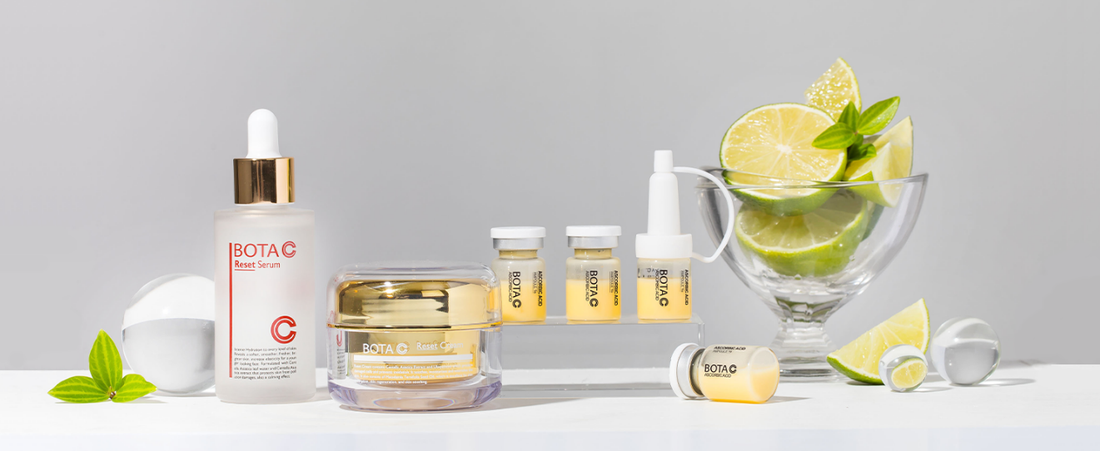
The Proven Benefits of Vitamin C in Skincare
Share
The Proven Benefits of Vitamin C in Skincare
Vitamin C has long been recognized as one of the most effective and well-researched active ingredients in skincare. Often recommended by dermatologists and widely used in clinical-grade treatments, Vitamin C delivers visible improvements in skin tone, texture, and resilience.
In this article, we explore the science-backed effects of Vitamin C when used in skincare formulations — and why it should be a core part of your routine.
1. Brightens the Skin and Fades Hyperpigmentation
Vitamin C plays a key role in reducing pigmentation and brightening the complexion. It works by inhibiting the enzyme tyrosinase, which is responsible for melanin production. As a result, Vitamin C helps to fade dark spots, acne scars, and sun damage, leading to a more even and radiant skin tone.
In clinical use, topical Vitamin C has been shown to significantly reduce melasma and post-inflammatory hyperpigmentation when used consistently.
2. Provides Antioxidant Protection
Environmental stressors — including UV exposure, pollution, and free radicals — accelerate the aging process and cause visible skin damage. Vitamin C is a potent antioxidant that neutralizes these external aggressors, protecting the skin from premature aging and oxidative stress.
By reducing the impact of daily environmental exposure, Vitamin C helps maintain the skin’s clarity and health.
3. Stimulates Collagen Production
Collagen is the structural protein that maintains the skin's firmness and elasticity. As we age, collagen synthesis naturally declines, leading to wrinkles, sagging, and a loss of volume. Vitamin C supports fibroblast activity, which stimulates new collagen production and helps restore a more youthful skin structure.
For clients concerned with fine lines or skin laxity, Vitamin C-based serums and creams can provide both preventive and corrective benefits.
4. Enhances Skin Repair and Recovery
In addition to its antioxidant and collagen-boosting properties, Vitamin C promotes skin healing. It has anti-inflammatory benefits that can help calm redness and irritation, making it suitable for post-treatment care or for those with acne-prone or sensitive skin.
This makes Vitamin C a valuable ingredient not only for anti-aging, but also for overall skin resilience.
5. Complements Other Skincare Ingredients
Vitamin C works synergistically with ingredients such as hyaluronic acid, peptides, ferulic acid, and niacinamide. When formulated correctly, it enhances the efficacy of these actives, resulting in more comprehensive skin benefits.
However, Vitamin C should be used with caution alongside strong exfoliating acids unless guided by a professional or incorporated into a balanced formula.
Recommended Product: Radiance Bota C Serum
At Healing by J, we recommend the Radiance Bota C Serum — a dual-function brightening and firming serum that combines Vitamin C with Centella Asiatica and amino acid complexes. It offers deep hydration, anti-aging support, and visible improvement in skin clarity, making it ideal for daily use or as part of a clinic-grade skincare regimen.
Conclusion
Vitamin C is one of the most effective ingredients in modern skincare. Whether you're targeting dullness, pigmentation, fine lines, or environmental damage, incorporating Vitamin C into your daily routine can lead to significant improvements in skin health and appearance.
